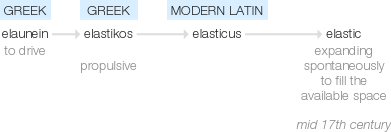Elastic
mid 17th century (originally describing a gas in the sense ‘expanding spontaneously to fill the available space’): from modern Latin elasticus, from Greek elastikos ‘propulsive’, from elaunein ‘to drive’.
wiktionary
From French élastique, from New Latin elasticus(“elastic”), from Ancient Greek ἐλαστός(elastós), alternative form of ἐλατός(elatós, “ductile”) (cf. ἐλατήρ(elatḗr, “a driver, hurler”)), from ἐλαύνω(elaúnō, “to drive, set in motion, push, strike, beat out”).
etymonline
elastic (adj.)
1650s, formerly also elastick, coined in French (1650s) as a scientific term to describe gases, "having the property of recovering its former volume after compression," from Modern Latin elasticus, from Greek elastos "ductile, flexible," related to elaunein "to strike, beat out," which is of uncertain origin; according to Watkins from an extended form of the PIE base *ele- "to go."
Applied to solids from 1670s, "having the power of returning to the form from which it is bent, etc., as soon as the applied force is removed." Figurative use by 1859. The noun meaning "piece of elastic material," originally a cord or string woven with rubber, is from 1847, American English.
